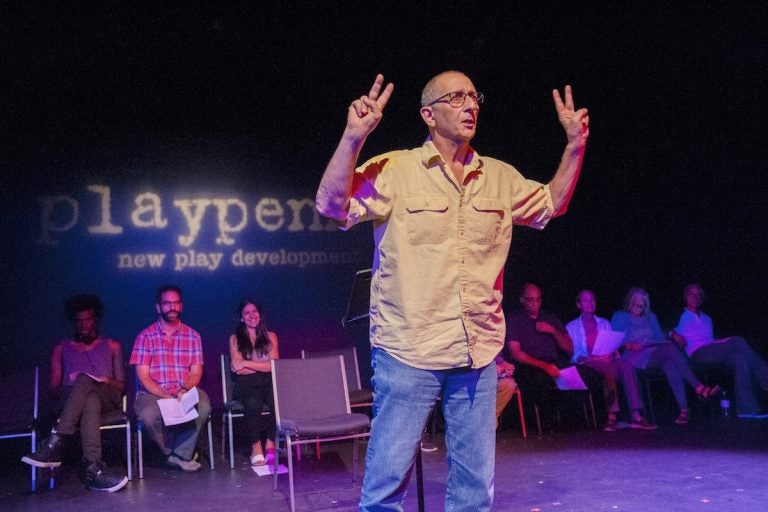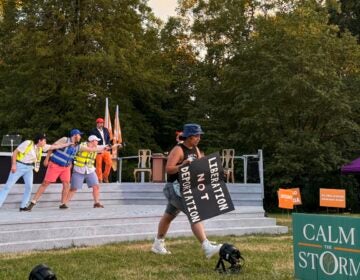Theater artists speak out against PlayPenn leadership
An organization that helps playwrights develop new work has come under fire with accusations of racism and sexual harassment.
Listen 1:37
PlayPenn artistic director Paul Meshejian in a playwrights' session at the 2017 New Play Development conference. (Credit: John Flak)
Theater artists are demanding the resignation of the leadership of a Philadelphia theater organization that develops new plays. Past and present staff and participants of PlayPenn are accusing management of favoring white theater artists and downplaying sexual misconduct.
PlayPenn is an organization that helps playwrights develop new work. For 15 years, it has held an annual conference wherein a handful of playwrights are able to test out their scripts before a live audience. Playwrights, chosen through a paneled selection process, present their work as staged readings with a cast of actors.
In 2017, the organization got a shot in the arm when one of the plays it helped develop, “Oslo” was performed on Broadway and won a Tony Award. A year later, founding artistic director Paul Meshejian was personally given a Lifetime Achievement Award during the Barrymore Award ceremony in Philadelphia.
This year’s PlayPenn conference was supposed to be this week, held virtually due to the COVID-19 pandemic. One of the scripts to be presented was going to be a work in progress based on the true story of librarians in Philadelphia’s Kensington neighborhood who distributed Narcan to people overdosing in the park outside the library.
That conference has been canceled, as Meshejian is facing criticism from former staff and past participants in the conference.
“PlayPenn is the worst managed playwriting conference in the country,” said Dave Harris, a Philadelphia native now living in San Diego, Ca, writing on Facebook.
Harris was selected to have a script he was working on, “Incendiary,” presented by actors in a staged reading. Harris took particular offense to the conference’s insistence on “colorblind” casting, assigning actors to roles regardless of race.
“They put us in a position where we were listening to non-Black actors say and dance around saying the ‘N’ word in our scripts,” wrote Harris. “They told us this was in the name of supporting our work. It harmed our work.”
Harris is among many people calling for Meshejian to leave. At least three staff members have resigned in the last week.
Former staff members have come forward with claims that a former board member, who was a major donor until very recently, sexually harassed them at PlayPenn functions.
A playwright and former education director for PlayPenn, Sarah Mantell, said it’s an “open secret” that former board member Victor Keen would act inappropriately with female staff.
In July 2014 she sent an email to Meshejian, writing “The problem with Victor has escalated to the point where I think we need to rethink our approach to him. I’m aware of him groping at least four of our artists and, even more upsettingly, one of our interns tonight.”
Mantell says she was harassed by Keen herself. She approached PlayPenn management with her complaint, separate from the aforementioned email, but was “dismissed.”
“That was the thing that finally broke me,” she wrote from New York in a recent email interview. “I have not, honestly, been able to imagine returning to Philly as an artist since then.”
Another former staff member, Kelsey Hodgkiss, was an intern in 2014 when she says Keen acted in a “rude and lude” manner to her. “I was a young woman fresh out of college at my first job in the industry and was harassed by a prominent board member and donor at a work event I was required to be at,” she wrote to PlayPenn board on July 12. “This alone should not have been acceptable.”
Keen is no longer a board member of PlayPenn, but until last week continued to be a major supporter. He has sat on the boards of the Kimmel Center, the Philadelphia Film Society, and the Philadelphia Theatre Company, and is board president of the Performance Garage, which he co-founded with his wife, choreographer Jeanne Ruddy.
On Friday, Meshejian addressed the racial and sexual allegations in a public letter posted to the PlayPenn website and Facebook page. He admitted several times in a repeated refrain, “We failed, and it is on all of us,” in regards to the lack of diversity in playwrights and staff. He outlined steps to systematically repair that diversity, including anti-bias training and doing outreach into a wider range of development organizations and writing groups to broaden the pool of talent at the conference.
While promising to “do better,” Meshejian’s letter also pointed out that selected playwrights of color at the conference every year range from 16% to 50%, and people of color who would have been at this year’s conference was 65%.
Regarding the allegations of sexual harassment, Meshejian wrote that PlayPenn has returned a financial gift to a “longtime donor,” and the organization has severed future tied with the unnamed person.
In a statement released Tuesday, the board of PlayPenn said they are “appalled” by the allegations of sexual misconduct. Without naming anyone, the board said they have hired the firm Griesing Law, LLC, to “aggressively investigate them to determine what happened, who knew about the allegations, and how PlayPenn staff and representatives responded to them.”
Keen has released his own statement. “These allegations are shattering to me. I am truly sorry and apologize to those who found my behavior to be inappropriate and will be more aware of my interactions with others going forward,” he wrote on Wednesday. “It is unfortunate my relationship and strong support of PlayPenn has been destroyed, and I am incredibly disappointed in how the organization handled it.”
In his letter — which has since been taken down from the website — Meshejian took an apologetic tone when he wrote, “We allowed the friendship, conviviality, history and generosity of a former member of our board to cloud our better judgement.”
Some former PlayPenn participants and staff are not satisfied.
“The statement does not contain an apology,” said Mantell. “[Meshejian] praises our abuser. He still cannot identify his harm specifically to Black artists or even use the word Black. He continues to protect himself and Victor Keen by refusing to name him and forces me, once again, to do it myself.”
These allegations of racial bias and sexual harassment have come forward now because a Philadelphia theater artist and arts educator, Terrell Green, began mobilizing artists to hold arts leaders accountable. During this time when theaters are closed due to the COVID pandemic and many artists are out of work, Green began demanding better leadership in the arts sector.
Green was spurred by an article in a local Metro newspaper about the upcoming conference, which was accompanied by photos of many participating African Americans. Green took issue with the fact that, in reality, only one participating playwright was Black, not as many as the photos would lead a reader to believe.
“I’m asking people to whistleblow,” said Green. “When I started to call out the lack of leadership, we got to a conversation where it was, ‘Oh, this is a conversation about equity. This is a conversation about racism.’ But then we started to get the conversation about sexual violence.”
After taking aim at PlayPenn, Green plans to hold other theater companies accountable for their leadership during the pandemic. He says he does not want to see theater companies disappear, but as artists suffer the shutdown economy, he says the leaders and their boards should proactively support them.
“I know it’s old money running the theater scene in Philadelphia. The money runs deep,” said Green. “There is no reason we should not be doing more for the community.”
WHYY is your source for fact-based, in-depth journalism and information. As a nonprofit organization, we rely on financial support from readers like you. Please give today.





